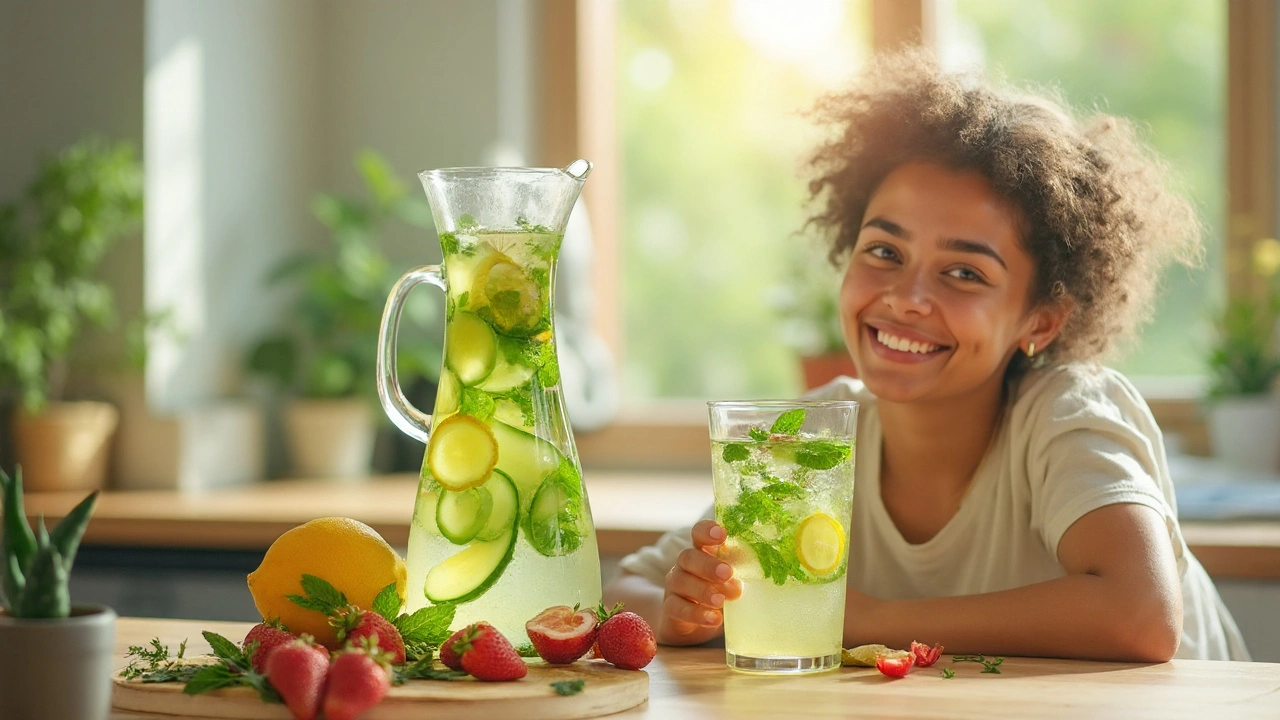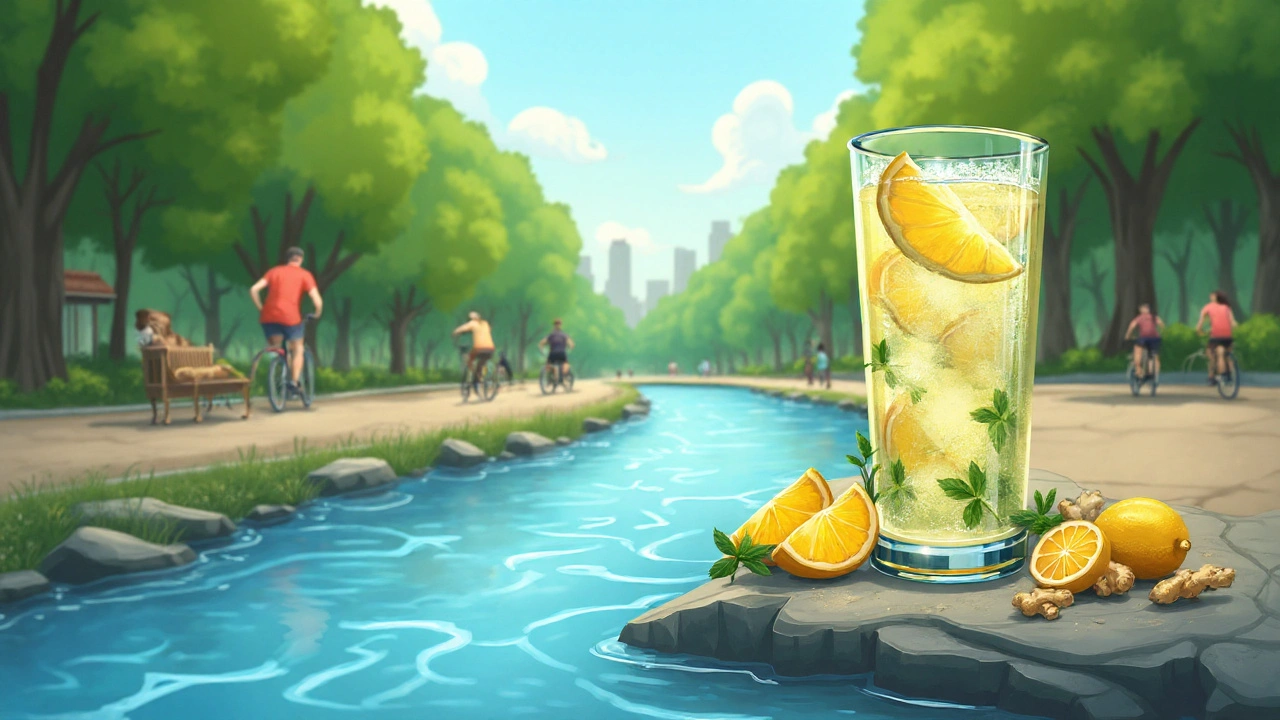
Detox Drink Finder Quiz
Detox drink is a beverage formulated to support the body's natural elimination pathways, mainly the liver, kidneys, and skin, by delivering high levels of water, antioxidants, and specific phytochemicals. If you’ve ever Googled “best drink to flush out toxins,” you’re probably looking for a sip that hydrates, energises, and nudges waste out of your system without harsh diuretics or synthetic additives. Below we break down the science, compare the top contenders, and give you a DIY guide to create your own toxin‑flushing elixir.
Why Your Body Needs a Dedicated Detox Drink
Our organs are built for detoxification. The liver filters blood, the kidneys regulate fluid balance, and the skin excretes sweat. However, modern diets - high in processed sugars, refined oils, and environmental pollutants - can overload these pathways. A well‑crafted detox drink boosts hydration the amount of water available for cellular processes, supplies antioxidants molecules that neutralise free radicals and reduce oxidative stress, and delivers phytochemicals that stimulate liver enzymes (like glutathione‑S‑transferase). The result? Faster removal of metabolic waste, clearer skin, steadier energy, and a calmer gut.
Top Five Evidence‑Backed Detox Drinks
Research (Australian National Health and Medical Research Council, 2023) identifies five drinks that consistently rank high for hydration, antioxidant capacity, and liver‑supporting compounds. Each entry below includes the key ingredients, typical ORAC (Oxygen Radical Absorbance Capacity) value, and ideal consumption window.
Lemon‑Infused Water plain water enhanced with fresh lemon juice and optional cucumber slices
- Key ingredients: filtered water, ½ lemon (≈30ml juice), 4 cucumber ribbons.
- ORAC: ~350µmol TE per 250ml (primarily from vitaminC).
- Hydration rating: 98% (near‑pure water).
- Best time: Morning, right after waking, to jump‑start liver enzymes.
Lemon provides citric acid, which assists the liver in converting stored fat into energy, while cucumber adds silica for skin health. The drink is gentle, making it suitable for daily use.
Green Tea with Ginger steeped green tea infused with fresh ginger root
- Key ingredients: 1tsp loose green tea, 2mm ginger slice, 250ml hot water.
- ORAC: ~1,200µmol TE per cup (epigallocatechin‑gallate, EGCG).
- Hydration rating: 85% (caffeine reduces pure water content slightly).
- Best time: Mid‑morning, to boost metabolism without disrupting sleep.
Green tea is rich in catechins that up‑regulate phase‑II detox enzymes, while ginger adds anti‑inflammatory gingerols. Together they create a mild thermogenic effect, helping the body burn excess calories.
Dandelion Root Tea an herbal infusion made from roasted dandelion root
- Key ingredients: 1tsp roasted dandelion root, 250ml hot water, optional honey.
- ORAC: ~800µmol TE per cup (beta‑carotene, flavonoids).
- Hydration rating: 80%.
- Best time: Early afternoon, to aid liver bile flow.
Dandelion stimulates bile production, which improves fat digestion and toxin excretion. Its mild diuretic effect also helps the kidneys flush excess sodium.
Apple Cider Vinegar (ACV) Elixir water mixed with raw, unfiltered apple cider vinegar, a dash of honey, and cinnamon
- Key ingredients: 250ml water, 1tbsp raw ACV, ½ tsp honey, pinch of cinnamon.
- ORAC: ~500µmol TE per serving (acetic acid, polyphenols).
- Hydration rating: 92%.
- Best time: Before meals to stabilise blood sugar and promote satiety.
Acetic acid improves insulin sensitivity, which indirectly reduces toxic load by limiting fat storage. Cinnamon adds further antioxidant power.
Activated Charcoal Water filtered water infused with a small amount of activated charcoal
- Key ingredients: 250ml water, ¼tsp activated charcoal powder.
- ORAC: negligible (adsorption, not antioxidant).
- Hydration rating: 70% (charcoal binds water molecules).
- Best time: Mid‑day, but not within 2hours of medication.
Charcoal’s porous surface traps toxins in the gut, preventing re‑absorption. Use sparingly; chronic use can deplete electrolytes.
Comparison of the Top Detox Drinks
| Drink | Primary Antioxidant | Hydration % | Best Time | Flavor Profile |
|---|---|---|---|---|
| Lemon‑Infused Water | VitaminC | 98% | Morning | Bright, citrusy |
| Green Tea with Ginger | EGCG (catechins) | 85% | Mid‑morning | Earthy, spicy |
| Dandelion Root Tea | Flavonoids | 80% | Early afternoon | Nutty, slightly bitter |
| Apple Cider Vinegar Elixir | Polyphenols | 92% | Before meals | Tart, warm |
| Activated Charcoal Water | None (adsorption) | 70% | Mid‑day | Neutral, earthy |

DIY Guide: Build Your Own Daily Detox Drink
Mix‑and‑match ingredients based on the tables above. Here’s a step‑by‑step recipe that balances hydration, antioxidants, and liver‑friendly compounds.
- Start with 500ml filtered water the base of any detox drink.
- Add the juice of one whole organic lemon (≈60ml) for vitaminC.
- Stir in a teaspoon of raw apple cider vinegar supports blood‑sugar balance.
- Drop in ¼tsp of freshly grated ginger for anti‑inflammatory benefits.
- Optional: a pinch of turmeric (curcumin) and black pepper to boost absorption.
- Let the mix sit 5minutes, then sip throughout the day. Keep it refrigerated if you prefer cold.
Adjust the lemon‑to‑vinegar ratio if the taste feels too sharp; the goal is a drink you’ll actually drink.
Safety Tips & Common Pitfalls
Even natural drinks can backfire if you ignore a few basics:
- Over‑diuresis: Too much charcoal or dandelion can cause frequent urination and electrolyte loss. Limit to 1‑2 servings per day.
- Medication interactions: Charcoal adsorbs many drugs. Wait at least two hours after taking prescription meds.
- Acidity: Excess ACV may erode enamel. Use a straw and rinse mouth with water afterwards.
- Allergies: Citrus, ginger, or cinnamon can trigger sensitivities in some people. Substitute with milder fruit (e.g., orange) if needed.
Listen to your body. If you feel light‑headed, increase plain water intake and reduce the detox drink concentration.
Related Concepts: Antioxidants, Micronutrients, and Organ Support
Detox drinks are just one piece of a broader health puzzle. The following topics often appear alongside toxin‑flushing discussions:
- Antioxidants molecules that neutralise free radicals and protect cells from oxidative damage - found in berries, leafy greens, and many of the drinks above.
- Micronutrients essential vitamins and minerals needed in small amounts for enzyme function - magnesium supports kidney filtration; selenium aids liver glutathione production.
- Liver support herbs botanicals like milk thistle, artichoke leaf, and burdock root that enhance hepatic detox pathways.
Exploring these areas can deepen the benefits you get from your daily detox drink. For example, pairing a lemon‑water routine with a magnesium‑rich diet (nuts, seeds) helps the kidneys filter waste more efficiently.
Frequently Asked Questions
Can I drink detox beverages every day?
Yes, as long as the drinks are low‑calorie, mainly water‑based, and you avoid over‑use of strong adsorbents like charcoal. Rotate between lemon water, green tea, and a mild ACV elixir to keep things balanced.
Do detox drinks actually remove toxins?
They don’t magically whisk away pollutants, but they support the liver and kidneys by providing hydration, antioxidants, and compounds that up‑regulate detox enzymes. Clinical studies show improved markers of oxidative stress after a week of regular intake.
Is activated charcoal safe for long‑term use?
Use it sparingly - 1‑2 times per week - and never with prescription meds, as it can reduce drug absorption. Monitor electrolyte levels if you notice fatigue or muscle cramps.
What’s the best time to drink lemon‑water?
First thing in the morning, on an empty stomach. The citric acid helps kick‑start digestive enzymes and encourages bile flow for the day ahead.
Can children have these detox drinks?
Kids can enjoy milder versions - dilute lemon‑water or a weak green tea (no caffeine) - but avoid strong acids like ACV or charcoal unless a pediatrician advises otherwise.

